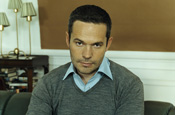Tyler Brûlé does not attend every meeting with London media agencies because he can, by his own admission, be "a bit short" when press buyers profess ignorance of the Monocle brand.
"I don't know if media buyers are playing a game or not, but they are paid to understand the magazine market, and so they are not doing their job," he says. "And our launch has not exactly been quiet."
But despite the occasional set-to with recalcitrant buyers, most agencies have "pretty solid understanding and respect" for the fledgling magazine, which celebrated its first birthday on St Valentine's Day.
Looking back on the first year, Brûlé, editor-in-chief and chairman of Monocle and Monocle.com, says: "The recognition from the marketplace is stronger than I perhaps thought, and I am thrilled with the impact."
Monocle, originally called The Edit, is "a completely different animal" to Brûlé's previous magazine, Wallpaper. Whereas Wallpaper is primarily a lifestyle title, Monocle is a "global briefing" for an international, well-heeled audience, with an A to E contents list of affairs, business, culture, design and edits.
Brûlé explains: "Readers need to work quite hard at the front end of the magazine, with political affairs and business, then at the back you have fashion and a pure piece of entertainment in the form of our manga. The magazine repays you the deeper you get into it."
International audience
Although Monocle's head office is in London's Marylebone, it is, Brûlé stresses, "not a British, but a global magazine". Monocle is published as a single global edition, and any advertiser who wants to reach a more specific audience must take out a pan-regional insert.
"People are moving around the planet more than ever before," says Brûlé. "Yet media still resides within national borders and brands still have national budgets. There is a growing constituency of consumers who want a global view."
Brûlé is waiting to release an ABC certificate until he is "quite satisfied" that the magazine is reaching every key global market.
Monocle currently has a print run of 150,000; around 7,000 of these are to service subscriptions and, with a global distribution, the news-stand unsolds are usually high.
Monocle's cover price of £5 makes it one of the more expensive magazines. The title also has a unique subscription model, charging £75 for 10 issues - 50% more than the UK cover price. Subscription allows access to the stories and archive content on Monocle.com.
At the last count, Monocle had subscribers in 85 countries, with a core distribution in 40 to 50 countries.
Brûlé, who doesn't believe in reader research, last month invited all the magazine's 1,000 subscribers within the M25 to a party in the Monocle offices.
"That was the best research we could have done," he says. "We saw the readers' average age was 34 to 39, more than half were foreign nationals and they were universally well-dressed but not trendy: Savile Row suits and good shoes. There were more City boys than I expected, and most mentioned the FT as their favourite newspaper."
Broadcast content
Monocle goes for a similar feel to the FT online at Monocle.com, where well-produced broadcast content attracts an average of 120,000 unique users per month. Some stories are broken online ahead of the print edition, such as footage from this month's Geneva Auto Show.
To keep the site looking clean, Monocle.com has no banner or pop-up ads; the focus is on major long-term sponsorship deals, with brands such as American Express and HSBC committing to a minimum of six months. Monocle's digital strategy for the next year is to introduce more set programmes online. It will also develop its podcast on iTunes, launched last October, which beat the BBC and The Economist to take the Christmas number one in the news and politics category.
Brûlé is glad, given the state of the global economy, that Monocle has spent time attracting Asian advertisers. For example, Japanese sanitary fixtures giant Toto is paying for a four-part manga advertorial, introduced from the May issue. He hopes further quirky forms of advertising, such as product placement in the regular manga pages, will insulate Monocle from a recession, as should its online e-shopping experience.
One year since launch, Monocle has reported two profitable periods to investors, and plans to be fully profitable within 36 to 40 months. Although advertising is not cheap, with page rates starting at £10,750, brands such as Rolex are sticking by the brand, with premium sites booked up well into next year.
It only remains to convince those last few stubborn media buyers. In answer to those who say Monocle is too expensive, Brûlé maintains that quality titles demand a different price. "I've got news for you," he says. "Real journalism is expensive."
CV
2007-present: Editor-in-chief and chairman, Monocle and Monocle.com
2005-2006: Presenter and co-producer, The Desk and Counter Culture (BBC4) 2003-2007 Columnist, the FT and The New York Times
1998-present: Chairman and creative director, Winkreative (formerly Wink Media)
1996-2002: Founder and editorial director, Wallpaper
1989-1996: Trainee and freelance journalist, BBC, and freelance journalist for Stern, Vanity Fair, The Sunday Times and ABC News
1986-1988: Vermont and Ryerson University, Toronto.
Feature
Monocle chief Brûlé embraces a global view
A year after launching Monocle, a glossy magazine aimed at the affluent and well-travelled, founder and editor-in-chief Tyler Brûlé gives Harriet Dennys his view of the impact the title has made so far.


